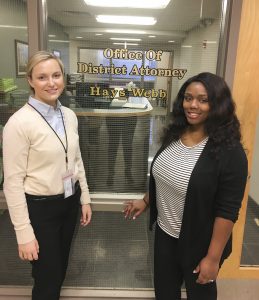
Katrena Dale would immediately feel the sting of the news she had to deliver.
One of her clients in a custody case had recently disclosed to her that she smokes marijuana, which, in Alabama, is a misdemeanor crime.
Dale had to file her first report of child abuse.
“It hurt me because the client really cared about her kids and didn’t know [marijuana use] was considered child abuse,” said Dale, a first-year graduate student in the School of Social Work at The University of Alabama. “She could potentially have her kids taken away from her.”
Dale and MSW May graduate Theresa Sprain were victims’ services interns at the Tuscaloosa District Attorney’s office this spring, where they completed individual assessments for victims and helped establish support groups for victims of domestic violence and for mothers and fathers during custody and child support hearings.
“This is a new partnership and part of a larger initiative of integrating social workers into innovative community engagement practicums,” said Joanne Terrell, program coordinator and UA social work instructor. “We started from the ground up – there had never been a successful social work placement at the DA’s office.”
Dale had previous field experience as a counselor with Tuscaloosa Child Abuse Prevention Services, where she helped educate children at Tuscaloosa-area schools to discourage bullying and peer pressure. Terrell, who has worked for more than 30 years in the criminal justice system, also prepared Dale for the peaks and valleys she’d experience during the program.
A unique experience
Despite their preparation, Dale and Sprain didn’t know the entire scope of the semester-long program, which began in January 2017. The DA’s office wasn’t sure, either, but district attorney Hays Webb, who was elected in 2016, and Marilyn Anderson, victims’ services officer, were keen to strengthen the office’s communication and work with victims. Prior to the interns’ arrival, the DA’s office identified and contacted 1,800 victims of felony crimes who hadn’t received correspondence over a number of years, Webb said.
Sprain and Dale helped identify 200 additional victims that weren’t identified in the office’s previous efforts. Dale and Sprain also provided additional courtroom support for victims of misdemeanor crimes by assessing victims’ needs, from establishing the first line of communication to connecting victims to services, to better deal with their circumstances.
“When we met in November, we told them they’re not plugging into something that’s already created,” Webb said. “There wasn’t a definitive plan or particular tasks early on, but their benefit was, with a well-running program, they’d get to say ‘we’re the only people who’ve ever started such a program in Tuscaloosa County.’ Their work this spring really helped bolster the work of our victims’ services office.”
Webb and Terrell said that, to their knowledge, a social work internship program of this kind does not exist in the state of Alabama, in part because of its uniqueness of working with victims. In contrast, services and programs to better assist defendants are more common. Terrell started the social work internship program in the public defenders office in Tuscaloosa, where Webb spent a portion of his nearly 20 years as a defense attorney.
Enhanced victim support
Their shared experiences working with defenders illuminated the need for enhanced victims support.
“Even if a trial date is set, victims’ services officers can only work with victims who are about to go to trial,” Terrell said, “but in the meantime, victims are out there, angry and upset, and that’s where Hays wanted to channel his focus.”
Sprain said she and Dale handled mostly domestic violence cases, where they assessed individual needs, like counseling, food and clothing, and worked with agencies like Turning Point to link victims advocates in the courtroom.
Sprain and Dale worked closely with the child support court to establish support groups for both custodial and non-custodial parents. This collaboration included weekly psycho-educational support groups, which provided a therapeutic outlet for single mothers and parents struggling through the child support process. It provided a safe place for parents to cope, ask questions and address needs, especially for those who may not have another outlet for support.
For the non-custodial parents, the focus of the support groups was mostly in helping them find employment.
“Due to lack of employment, many of the fathers are in contempt of court for not paying, get sent to jail and still cannot pay,” Sprain said. “Our goal is to help them provide for their children in the best way possible.” She continues, “Some of the mothers and their children do not have a safe place to go home to. Instead of waiting hours in a courtroom, we can provide a supportive and healthy place to cope. We are able to provide these services to meet victims and families’ needs, which helps me sleep a little better at night.”
The internship program will continue in the fall with two undergraduate students, and again in the spring with two master’s level students. While some successes are quantifiable, like the number of victims who are connected to services, most positive outcomes are measured anecdotally. For Dale, some were as simple as finding resources to help a client pay her first power bill after her divorce.
“She was a victim of domestic abuse and needed help getting on her feet because her husband paid all the bills,” Dale said. “She had kids and was trying to find a job. Moments like that are what made this internship a great experience and shaped me incredibly.”
Contact
David Miller, UA Media Relations, 205/348-0825, david.c.miller@ua.edu
Source
Joanne Terrell, instructor, School of Social Work, 205/348-6229, jterrell@sw.ua.edu
